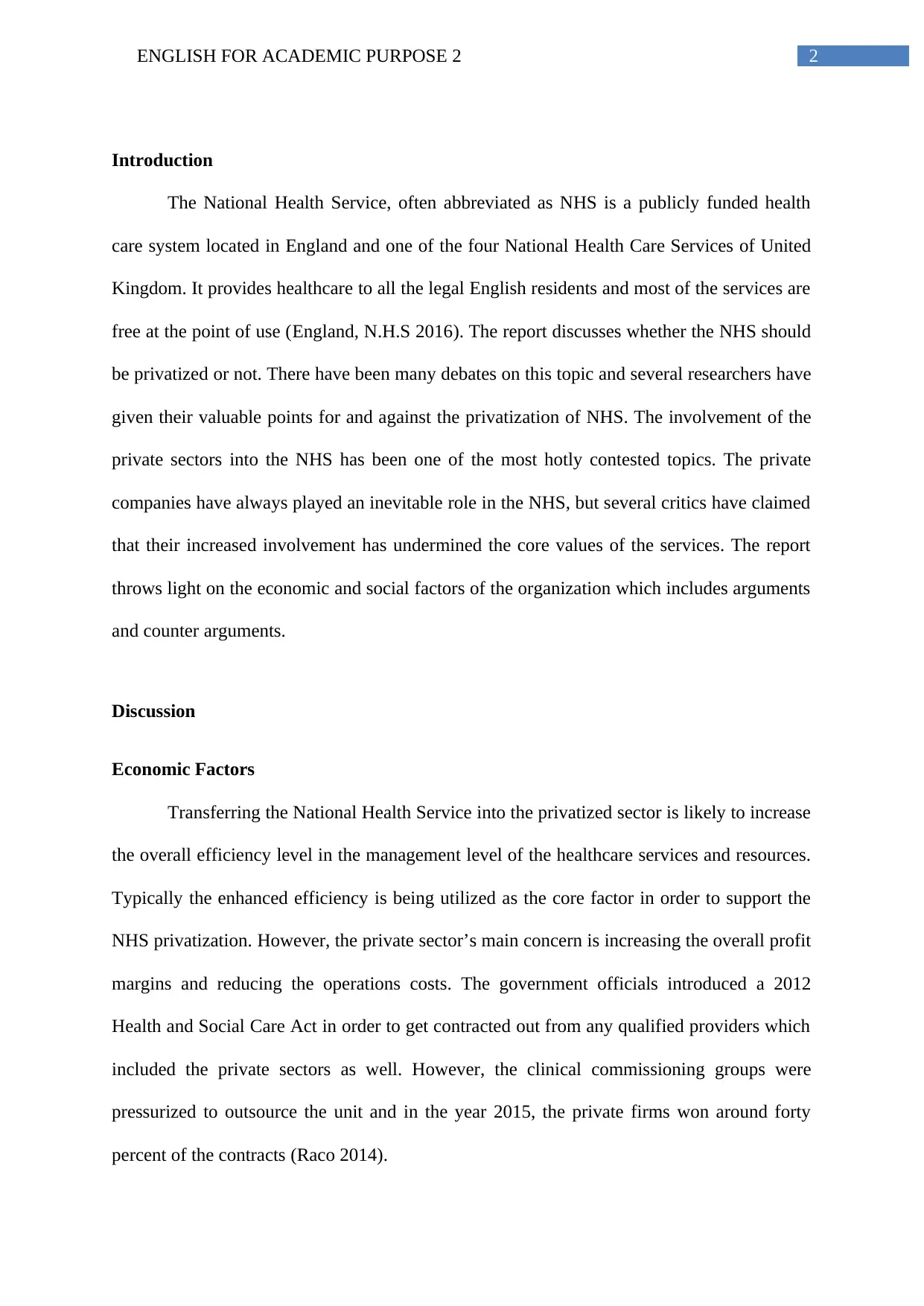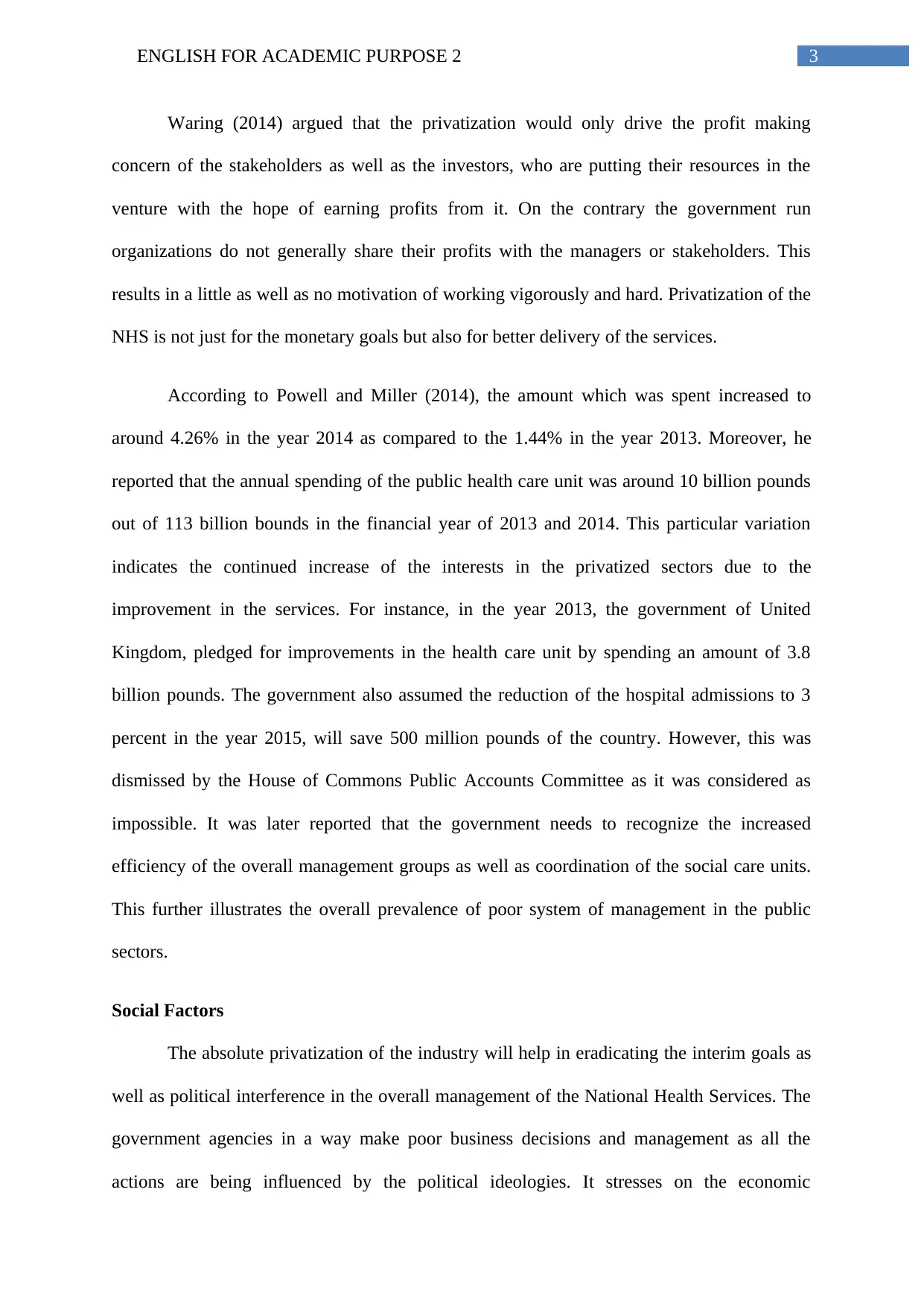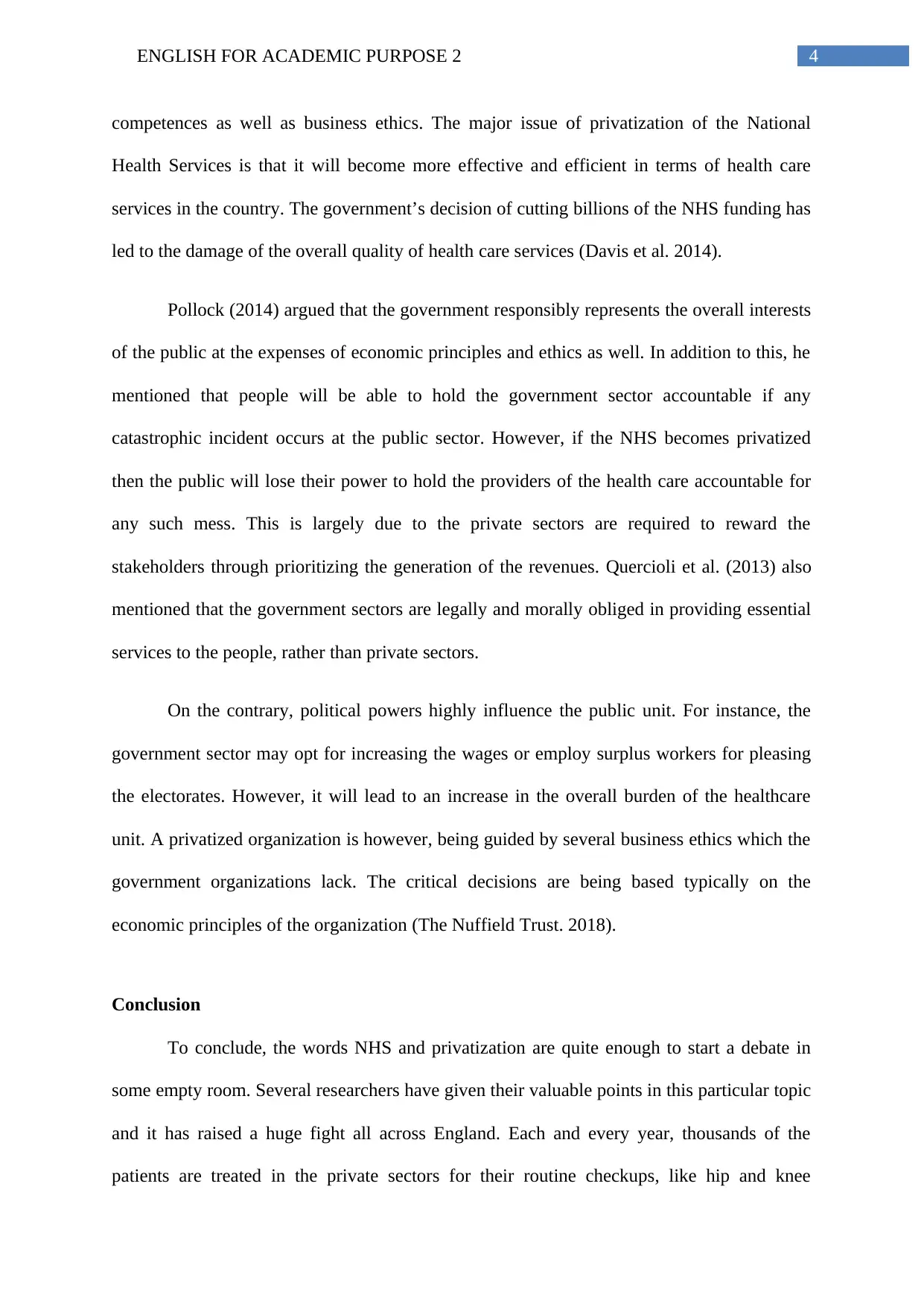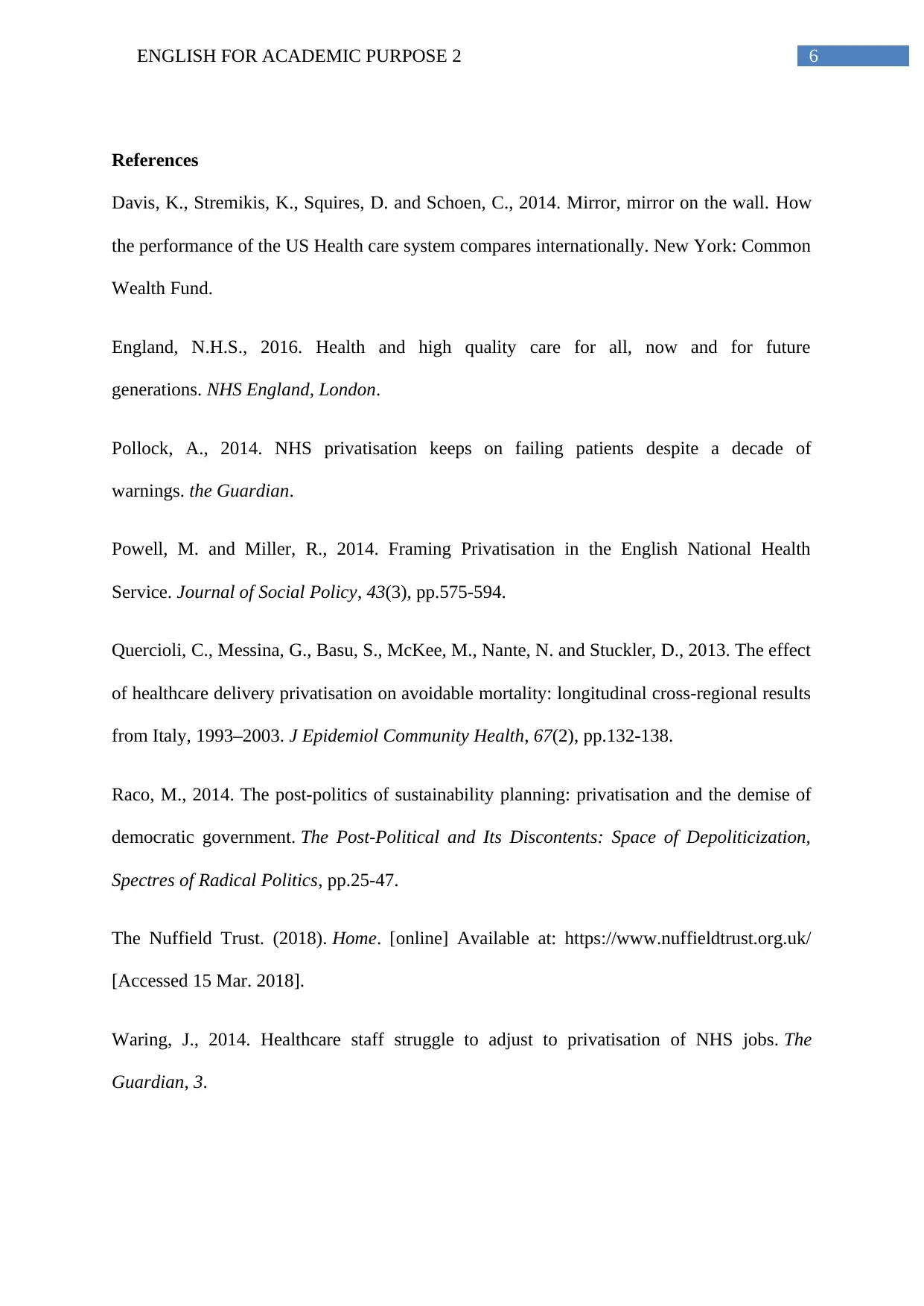Analyzing Economic and Social Factors: NHS Privatization Report
VerifiedAdded on 2021/04/24
|7
|1433
|58
Report
AI Summary
This report, prepared for an English for Academic Purpose 2 course, delves into the contentious issue of National Health Service (NHS) privatization in the United Kingdom. It meticulously examines the economic and social factors that fuel the debate, presenting arguments and counterarguments from various researchers and stakeholders. The report highlights potential efficiency gains through privatization, focusing on cost reduction and profit motives, while also addressing concerns about the erosion of core NHS values. It analyzes the impact of government policies, such as the 2012 Health and Social Care Act, and the involvement of private firms. Furthermore, the report explores the social implications of privatization, including political interference, the accountability of healthcare providers, and the impact on the quality of care. The conclusion summarizes the key points, emphasizing the ongoing debate and the increasing involvement of private sectors in the NHS, offering patients more choices and reduced waiting times.

Running head: ENGLISH FOR ACADEMIC PURPOSE 2
English for Academic Purpose 2
Name of the University:
Name of the Student:
Author Note:
English for Academic Purpose 2
Name of the University:
Name of the Student:
Author Note:
Paraphrase This Document
Need a fresh take? Get an instant paraphrase of this document with our AI Paraphraser

1ENGLISH FOR ACADEMIC PURPOSE 2
Table of Contents
Introduction................................................................................................................................2
Discussion..................................................................................................................................2
Economic Factors...................................................................................................................2
Social Factors.........................................................................................................................3
Conclusion..................................................................................................................................4
References..................................................................................................................................6
Table of Contents
Introduction................................................................................................................................2
Discussion..................................................................................................................................2
Economic Factors...................................................................................................................2
Social Factors.........................................................................................................................3
Conclusion..................................................................................................................................4
References..................................................................................................................................6

2ENGLISH FOR ACADEMIC PURPOSE 2
Introduction
The National Health Service, often abbreviated as NHS is a publicly funded health
care system located in England and one of the four National Health Care Services of United
Kingdom. It provides healthcare to all the legal English residents and most of the services are
free at the point of use (England, N.H.S 2016). The report discusses whether the NHS should
be privatized or not. There have been many debates on this topic and several researchers have
given their valuable points for and against the privatization of NHS. The involvement of the
private sectors into the NHS has been one of the most hotly contested topics. The private
companies have always played an inevitable role in the NHS, but several critics have claimed
that their increased involvement has undermined the core values of the services. The report
throws light on the economic and social factors of the organization which includes arguments
and counter arguments.
Discussion
Economic Factors
Transferring the National Health Service into the privatized sector is likely to increase
the overall efficiency level in the management level of the healthcare services and resources.
Typically the enhanced efficiency is being utilized as the core factor in order to support the
NHS privatization. However, the private sector’s main concern is increasing the overall profit
margins and reducing the operations costs. The government officials introduced a 2012
Health and Social Care Act in order to get contracted out from any qualified providers which
included the private sectors as well. However, the clinical commissioning groups were
pressurized to outsource the unit and in the year 2015, the private firms won around forty
percent of the contracts (Raco 2014).
Introduction
The National Health Service, often abbreviated as NHS is a publicly funded health
care system located in England and one of the four National Health Care Services of United
Kingdom. It provides healthcare to all the legal English residents and most of the services are
free at the point of use (England, N.H.S 2016). The report discusses whether the NHS should
be privatized or not. There have been many debates on this topic and several researchers have
given their valuable points for and against the privatization of NHS. The involvement of the
private sectors into the NHS has been one of the most hotly contested topics. The private
companies have always played an inevitable role in the NHS, but several critics have claimed
that their increased involvement has undermined the core values of the services. The report
throws light on the economic and social factors of the organization which includes arguments
and counter arguments.
Discussion
Economic Factors
Transferring the National Health Service into the privatized sector is likely to increase
the overall efficiency level in the management level of the healthcare services and resources.
Typically the enhanced efficiency is being utilized as the core factor in order to support the
NHS privatization. However, the private sector’s main concern is increasing the overall profit
margins and reducing the operations costs. The government officials introduced a 2012
Health and Social Care Act in order to get contracted out from any qualified providers which
included the private sectors as well. However, the clinical commissioning groups were
pressurized to outsource the unit and in the year 2015, the private firms won around forty
percent of the contracts (Raco 2014).
⊘ This is a preview!⊘
Do you want full access?
Subscribe today to unlock all pages.

Trusted by 1+ million students worldwide

3ENGLISH FOR ACADEMIC PURPOSE 2
Waring (2014) argued that the privatization would only drive the profit making
concern of the stakeholders as well as the investors, who are putting their resources in the
venture with the hope of earning profits from it. On the contrary the government run
organizations do not generally share their profits with the managers or stakeholders. This
results in a little as well as no motivation of working vigorously and hard. Privatization of the
NHS is not just for the monetary goals but also for better delivery of the services.
According to Powell and Miller (2014), the amount which was spent increased to
around 4.26% in the year 2014 as compared to the 1.44% in the year 2013. Moreover, he
reported that the annual spending of the public health care unit was around 10 billion pounds
out of 113 billion bounds in the financial year of 2013 and 2014. This particular variation
indicates the continued increase of the interests in the privatized sectors due to the
improvement in the services. For instance, in the year 2013, the government of United
Kingdom, pledged for improvements in the health care unit by spending an amount of 3.8
billion pounds. The government also assumed the reduction of the hospital admissions to 3
percent in the year 2015, will save 500 million pounds of the country. However, this was
dismissed by the House of Commons Public Accounts Committee as it was considered as
impossible. It was later reported that the government needs to recognize the increased
efficiency of the overall management groups as well as coordination of the social care units.
This further illustrates the overall prevalence of poor system of management in the public
sectors.
Social Factors
The absolute privatization of the industry will help in eradicating the interim goals as
well as political interference in the overall management of the National Health Services. The
government agencies in a way make poor business decisions and management as all the
actions are being influenced by the political ideologies. It stresses on the economic
Waring (2014) argued that the privatization would only drive the profit making
concern of the stakeholders as well as the investors, who are putting their resources in the
venture with the hope of earning profits from it. On the contrary the government run
organizations do not generally share their profits with the managers or stakeholders. This
results in a little as well as no motivation of working vigorously and hard. Privatization of the
NHS is not just for the monetary goals but also for better delivery of the services.
According to Powell and Miller (2014), the amount which was spent increased to
around 4.26% in the year 2014 as compared to the 1.44% in the year 2013. Moreover, he
reported that the annual spending of the public health care unit was around 10 billion pounds
out of 113 billion bounds in the financial year of 2013 and 2014. This particular variation
indicates the continued increase of the interests in the privatized sectors due to the
improvement in the services. For instance, in the year 2013, the government of United
Kingdom, pledged for improvements in the health care unit by spending an amount of 3.8
billion pounds. The government also assumed the reduction of the hospital admissions to 3
percent in the year 2015, will save 500 million pounds of the country. However, this was
dismissed by the House of Commons Public Accounts Committee as it was considered as
impossible. It was later reported that the government needs to recognize the increased
efficiency of the overall management groups as well as coordination of the social care units.
This further illustrates the overall prevalence of poor system of management in the public
sectors.
Social Factors
The absolute privatization of the industry will help in eradicating the interim goals as
well as political interference in the overall management of the National Health Services. The
government agencies in a way make poor business decisions and management as all the
actions are being influenced by the political ideologies. It stresses on the economic
Paraphrase This Document
Need a fresh take? Get an instant paraphrase of this document with our AI Paraphraser

4ENGLISH FOR ACADEMIC PURPOSE 2
competences as well as business ethics. The major issue of privatization of the National
Health Services is that it will become more effective and efficient in terms of health care
services in the country. The government’s decision of cutting billions of the NHS funding has
led to the damage of the overall quality of health care services (Davis et al. 2014).
Pollock (2014) argued that the government responsibly represents the overall interests
of the public at the expenses of economic principles and ethics as well. In addition to this, he
mentioned that people will be able to hold the government sector accountable if any
catastrophic incident occurs at the public sector. However, if the NHS becomes privatized
then the public will lose their power to hold the providers of the health care accountable for
any such mess. This is largely due to the private sectors are required to reward the
stakeholders through prioritizing the generation of the revenues. Quercioli et al. (2013) also
mentioned that the government sectors are legally and morally obliged in providing essential
services to the people, rather than private sectors.
On the contrary, political powers highly influence the public unit. For instance, the
government sector may opt for increasing the wages or employ surplus workers for pleasing
the electorates. However, it will lead to an increase in the overall burden of the healthcare
unit. A privatized organization is however, being guided by several business ethics which the
government organizations lack. The critical decisions are being based typically on the
economic principles of the organization (The Nuffield Trust. 2018).
Conclusion
To conclude, the words NHS and privatization are quite enough to start a debate in
some empty room. Several researchers have given their valuable points in this particular topic
and it has raised a huge fight all across England. Each and every year, thousands of the
patients are treated in the private sectors for their routine checkups, like hip and knee
competences as well as business ethics. The major issue of privatization of the National
Health Services is that it will become more effective and efficient in terms of health care
services in the country. The government’s decision of cutting billions of the NHS funding has
led to the damage of the overall quality of health care services (Davis et al. 2014).
Pollock (2014) argued that the government responsibly represents the overall interests
of the public at the expenses of economic principles and ethics as well. In addition to this, he
mentioned that people will be able to hold the government sector accountable if any
catastrophic incident occurs at the public sector. However, if the NHS becomes privatized
then the public will lose their power to hold the providers of the health care accountable for
any such mess. This is largely due to the private sectors are required to reward the
stakeholders through prioritizing the generation of the revenues. Quercioli et al. (2013) also
mentioned that the government sectors are legally and morally obliged in providing essential
services to the people, rather than private sectors.
On the contrary, political powers highly influence the public unit. For instance, the
government sector may opt for increasing the wages or employ surplus workers for pleasing
the electorates. However, it will lead to an increase in the overall burden of the healthcare
unit. A privatized organization is however, being guided by several business ethics which the
government organizations lack. The critical decisions are being based typically on the
economic principles of the organization (The Nuffield Trust. 2018).
Conclusion
To conclude, the words NHS and privatization are quite enough to start a debate in
some empty room. Several researchers have given their valuable points in this particular topic
and it has raised a huge fight all across England. Each and every year, thousands of the
patients are treated in the private sectors for their routine checkups, like hip and knee

5ENGLISH FOR ACADEMIC PURPOSE 2
operations. Public has preferred more privatized sectors as they take good care of the patients
and serve them well. This is not because the public sectors cannot treat their patients well, but
because the coalition between the political parties and the government sectors. However, it
increased and encouraged the private firms in getting involved with the National Health
Service. In addition to this, the private firms also reduced the waiting times of the patients
and are offering more choices and services to them.
operations. Public has preferred more privatized sectors as they take good care of the patients
and serve them well. This is not because the public sectors cannot treat their patients well, but
because the coalition between the political parties and the government sectors. However, it
increased and encouraged the private firms in getting involved with the National Health
Service. In addition to this, the private firms also reduced the waiting times of the patients
and are offering more choices and services to them.
⊘ This is a preview!⊘
Do you want full access?
Subscribe today to unlock all pages.

Trusted by 1+ million students worldwide

6ENGLISH FOR ACADEMIC PURPOSE 2
References
Davis, K., Stremikis, K., Squires, D. and Schoen, C., 2014. Mirror, mirror on the wall. How
the performance of the US Health care system compares internationally. New York: Common
Wealth Fund.
England, N.H.S., 2016. Health and high quality care for all, now and for future
generations. NHS England, London.
Pollock, A., 2014. NHS privatisation keeps on failing patients despite a decade of
warnings. the Guardian.
Powell, M. and Miller, R., 2014. Framing Privatisation in the English National Health
Service. Journal of Social Policy, 43(3), pp.575-594.
Quercioli, C., Messina, G., Basu, S., McKee, M., Nante, N. and Stuckler, D., 2013. The effect
of healthcare delivery privatisation on avoidable mortality: longitudinal cross-regional results
from Italy, 1993–2003. J Epidemiol Community Health, 67(2), pp.132-138.
Raco, M., 2014. The post-politics of sustainability planning: privatisation and the demise of
democratic government. The Post-Political and Its Discontents: Space of Depoliticization,
Spectres of Radical Politics, pp.25-47.
The Nuffield Trust. (2018). Home. [online] Available at: https://www.nuffieldtrust.org.uk/
[Accessed 15 Mar. 2018].
Waring, J., 2014. Healthcare staff struggle to adjust to privatisation of NHS jobs. The
Guardian, 3.
References
Davis, K., Stremikis, K., Squires, D. and Schoen, C., 2014. Mirror, mirror on the wall. How
the performance of the US Health care system compares internationally. New York: Common
Wealth Fund.
England, N.H.S., 2016. Health and high quality care for all, now and for future
generations. NHS England, London.
Pollock, A., 2014. NHS privatisation keeps on failing patients despite a decade of
warnings. the Guardian.
Powell, M. and Miller, R., 2014. Framing Privatisation in the English National Health
Service. Journal of Social Policy, 43(3), pp.575-594.
Quercioli, C., Messina, G., Basu, S., McKee, M., Nante, N. and Stuckler, D., 2013. The effect
of healthcare delivery privatisation on avoidable mortality: longitudinal cross-regional results
from Italy, 1993–2003. J Epidemiol Community Health, 67(2), pp.132-138.
Raco, M., 2014. The post-politics of sustainability planning: privatisation and the demise of
democratic government. The Post-Political and Its Discontents: Space of Depoliticization,
Spectres of Radical Politics, pp.25-47.
The Nuffield Trust. (2018). Home. [online] Available at: https://www.nuffieldtrust.org.uk/
[Accessed 15 Mar. 2018].
Waring, J., 2014. Healthcare staff struggle to adjust to privatisation of NHS jobs. The
Guardian, 3.
1 out of 7
Related Documents
Your All-in-One AI-Powered Toolkit for Academic Success.
+13062052269
info@desklib.com
Available 24*7 on WhatsApp / Email
![[object Object]](/_next/static/media/star-bottom.7253800d.svg)
Unlock your academic potential
Copyright © 2020–2026 A2Z Services. All Rights Reserved. Developed and managed by ZUCOL.





